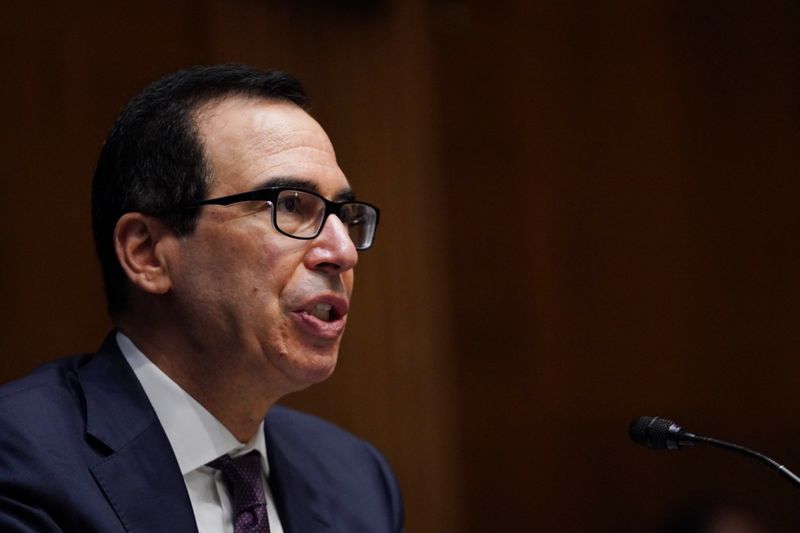By Jonnelle Marte
(Reuters) - U.S. Treasury Secretary Steven Mnuchin has said he would pull funding from several of the emergency lending programs set up by the Federal Reserve this year.
The announcement on Thursday, which effectively means the programs the Fed created to lend money to businesses and to state and local governments will end after Dec. 31, came as a surprise to Fed officials who said they would prefer to leave the backstops in place.
While Mnuchin says the programs could be reinstated later if needed, the move to claw back the funding now could make it more difficult for the next administration set up by President-elect Joe Biden to bring them back quickly.
Here is an overview of where the programs stand, what they accomplished and what it would take to revive them.
WHERE DO THE PROGRAMS STAND NOW?
Mnuchin extended four of the programs, including those that support money markets and short-term borrowing markets for companies, for 90 days beyond the end of the year.
But the programs funded by the CARES Act, including the facilities purchasing corporate bonds or providing loans to small and medium-sized businesses and state and local governments, will expire on Dec. 31.
WHAT DID THESE FACILITIES ACCOMPLISH?
Some of the programs weren't used very much. But policymakers at the Fed and Treasury agree that their presence helped to restore liquidity and instill confidence in financial markets severely rattled in the early days of the pandemic, allowing businesses and municipalities to continue to borrow.
Credit markets for corporations and municipalities froze up earlier this year because of the crisis. But the taps reopened, borrowing costs came down and stock markets recovered after the Fed said in late March that it would begin purchasing corporate bonds and provide credit as needed to state and local governments.
WHAT WILL HAPPEN IF THE PROGRAMS GO AWAY?
Some lawmakers and economists say they are worried about losing the backstops because infections are rising and the economy is showing signs of slowing down after a historic rebound in the third quarter. That could put more strain on businesses, municipalities and financial markets.
"What matters is that if the facilities are there, the market knows that if things go wrong" the Fed will step in if needed, said Roberto Perli, head of global policy research at Cornerstone Macro.
So far, though, markets have remained calm, potentially a sign that investors either believe credit markets are more stable or have faith the Biden administration will be able to provide support if needed, Perli said.
HOW HARD WOULD IT BE TO BRING THE EMERGENCY PROGRAMS BACK LATER?
Under the Federal Reserve Act, which was amended during sweeping financial regulation overhaul after the Great Recession, the Fed can only lend to businesses and municipalities under "unusual and exigent circumstances" and with approval from the Treasury Department.
If Mnuchin does not approve extensions for the programs, the Fed may need to wait for approval from the next administration. That could mean the Fed would not be able to make loans between Jan. 1 and Jan. 20, the date of Biden's inauguration.
Funding could also be a problem. If the Fed returns the funds it received under the CARES Act, it will need to seek more funding before it can offer more loans through the emergency programs. The Fed could potentially tap into money remaining in the Exchange Stabilization Fund. But finding additional funds could require action from Congress, a dicey proposition considering Democrats so far have failed to snag the Senate from Republican control.
CAN THE FED JUST DECIDE NOT TO RETURN THE FUNDS?
Some Fed analysts questioned whether the Fed was required to return the funds under the language of the CARES Act, or if it could continue lending with the money that Treasury has already transferred. But Fed chairman Jerome Powell said on Friday in a letter https://www.federalreserve.gov/foia/files/mnuchin-letter-20201120.pdf to Mnuchin that the Fed will return the unused emergency funds.

Following the Dodd-Frank reforms enacted after the 2007 to 2009 financial crisis, it was broadly accepted at the Fed that use of its extraordinary lending powers should be guided by Treasury, a principle the central bank may be hesitant to fight.